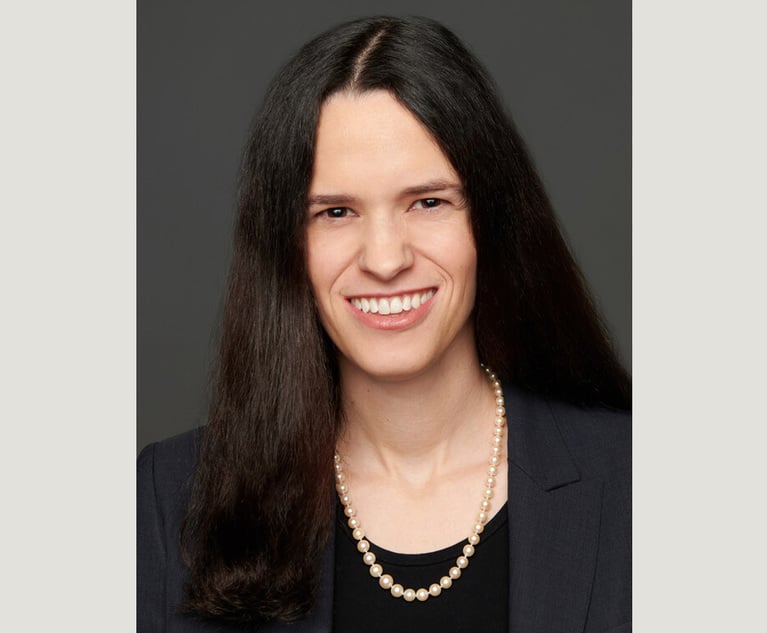Legal departments benefit when in-house counsel deviate from the norm
Why you shouldn't be afraid to break the mold
March 26, 2012 at 08:00 PM
4 minute read
It's human nature to develop a routine. Lawyers, particularly in-house attorneys who are more office-bound, are especially prone to following a pattern of behavior. We are creatures of habit, which may not always be beneficial.
So, it is important to “mix things up”—not just in your own practice but in your department or practice area. While there may be some initial resistance, each of us should be a catalyst for change that enhances our own legal skills and those of our attorneys and paralegals. This will challenge everyone to grow both professionally and personally. Some ideas:
Take the attorneys out of their respective “comfort zones.” Your attorneys have developed certain areas of expertise over time. Move them around so that their experience, expertise and exposure broadens. This will keep attorneys fresh. In addition, this will develop some cross-training among the legal staff, as the attorneys seek guidance from those who handled the areas of law or client base in the past. This needs to be handled realistically, of course. Some attorneys may simply not have the appropriate background or demeanor to move in and out of particular areas. However, a good inhouse counsel should be able to adjust to any area of law within the company's scope of business.
Invite representatives from various business units to address your legal team about their initiatives and business plans. The attorneys will become more connected to the business clients they represent, and understand the pressures and the constraints within which the business partners must operate. Open up a dialogue between the business partner and the legal team, and focus on breaking down some of the traditional walls that exist between them. A typical agenda for such meetings should include the business team member's view of the state of the business, her unit's shortterm and long-range objectives and ways to improve the manner in which the legal team works with the business unit. The meetings should not be gripe sessions but should be constructive.
Incorporate in-house training conducted by members of your legal team. Such in-house training will enable attorneys to develop their presentation skills. In addition, the training will expose other attorneys in the department to subject matters with which they may have limited or no knowledge.
Encourage your team to become involved in professional opportunities outside the department. These activities may include pro bono work, speaking at local continuing legal education sessions, participating in professional committees or teaching at a local law school. All of these activities enhance the individual's growth in the legal profession and positively reflect on the entire legal department. Such activities may be made part of the attorneys' bonus objectives.
Engage your team in off-site, community service-related activities. This can be an adjunct to your company's corporate social responsibility (CSR) program. If your company is not already engaged in community service through a formalized CSR program, the legal team should become a role model for the business team. Depending on the nature of the community service, the attorneys will develop a much better sense of how a successful team can achieve results when everyone works together on a common project that is not related to legal issues.
Many of these ideas can be scaled up or down depending on the size of the in-house legal department or practice groups. Most also can be applied to the paralegals in your department or practice area. The guiding principle should always be that the legal department comprises individuals with multiple skills, and remains dynamic and responsive to the needs of the company.
Thomas Lalla is SVP and GC of Pernod Ricard USA.
This content has been archived. It is available through our partners, LexisNexis® and Bloomberg Law.
To view this content, please continue to their sites.
Not a Lexis Subscriber?
Subscribe Now
Not a Bloomberg Law Subscriber?
Subscribe Now
NOT FOR REPRINT
© 2025 ALM Global, LLC, All Rights Reserved. Request academic re-use from www.copyright.com. All other uses, submit a request to [email protected]. For more information visit Asset & Logo Licensing.
You Might Like
View All
Advertising Tech Likely to Draw More Scrutiny in 2025 Over Consumers' Data, Lawyers Say
5 minute read

'Be Comfortable Being Uncomfortable': Pearls of Wisdom From 2024 GC Q&As

In-House Moves of the Month: Boeing Loses Another Lawyer, HubSpot Legal Chief Out After 2 Years
5 minute readTrending Stories
- 1Data Breach Lawsuit Against Byte Federal Among 1,500 Targeting Companies in 2024
- 2Counterfeiters Ride Surge in Tabletop Games’ Popularity, Challenging IP Owners to Keep Up
- 3Health Care Data Breach Class Actions Saw December Surge in NY Courts
- 4Florida Supreme Court Disbars 3, Suspends 11, Reprimands 1 in Final Disciplinary Order of 2024
- 5Chief Justice Roberts Ends Year With Defense Against 'Illegitimate' Attacks on Judiciary
Who Got The Work
Michael G. Bongiorno, Andrew Scott Dulberg and Elizabeth E. Driscoll from Wilmer Cutler Pickering Hale and Dorr have stepped in to represent Symbotic Inc., an A.I.-enabled technology platform that focuses on increasing supply chain efficiency, and other defendants in a pending shareholder derivative lawsuit. The case, filed Oct. 2 in Massachusetts District Court by the Brown Law Firm on behalf of Stephen Austen, accuses certain officers and directors of misleading investors in regard to Symbotic's potential for margin growth by failing to disclose that the company was not equipped to timely deploy its systems or manage expenses through project delays. The case, assigned to U.S. District Judge Nathaniel M. Gorton, is 1:24-cv-12522, Austen v. Cohen et al.
Who Got The Work
Edmund Polubinski and Marie Killmond of Davis Polk & Wardwell have entered appearances for data platform software development company MongoDB and other defendants in a pending shareholder derivative lawsuit. The action, filed Oct. 7 in New York Southern District Court by the Brown Law Firm, accuses the company's directors and/or officers of falsely expressing confidence in the company’s restructuring of its sales incentive plan and downplaying the severity of decreases in its upfront commitments. The case is 1:24-cv-07594, Roy v. Ittycheria et al.
Who Got The Work
Amy O. Bruchs and Kurt F. Ellison of Michael Best & Friedrich have entered appearances for Epic Systems Corp. in a pending employment discrimination lawsuit. The suit was filed Sept. 7 in Wisconsin Western District Court by Levine Eisberner LLC and Siri & Glimstad on behalf of a project manager who claims that he was wrongfully terminated after applying for a religious exemption to the defendant's COVID-19 vaccine mandate. The case, assigned to U.S. Magistrate Judge Anita Marie Boor, is 3:24-cv-00630, Secker, Nathan v. Epic Systems Corporation.
Who Got The Work
David X. Sullivan, Thomas J. Finn and Gregory A. Hall from McCarter & English have entered appearances for Sunrun Installation Services in a pending civil rights lawsuit. The complaint was filed Sept. 4 in Connecticut District Court by attorney Robert M. Berke on behalf of former employee George Edward Steins, who was arrested and charged with employing an unregistered home improvement salesperson. The complaint alleges that had Sunrun informed the Connecticut Department of Consumer Protection that the plaintiff's employment had ended in 2017 and that he no longer held Sunrun's home improvement contractor license, he would not have been hit with charges, which were dismissed in May 2024. The case, assigned to U.S. District Judge Jeffrey A. Meyer, is 3:24-cv-01423, Steins v. Sunrun, Inc. et al.
Who Got The Work
Greenberg Traurig shareholder Joshua L. Raskin has entered an appearance for boohoo.com UK Ltd. in a pending patent infringement lawsuit. The suit, filed Sept. 3 in Texas Eastern District Court by Rozier Hardt McDonough on behalf of Alto Dynamics, asserts five patents related to an online shopping platform. The case, assigned to U.S. District Judge Rodney Gilstrap, is 2:24-cv-00719, Alto Dynamics, LLC v. boohoo.com UK Limited.
Featured Firms
Law Offices of Gary Martin Hays & Associates, P.C.
(470) 294-1674
Law Offices of Mark E. Salomone
(857) 444-6468
Smith & Hassler
(713) 739-1250






